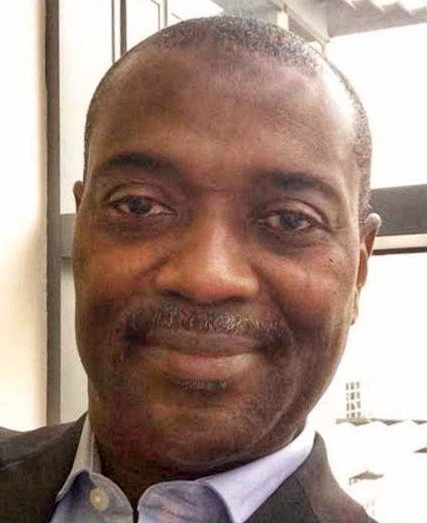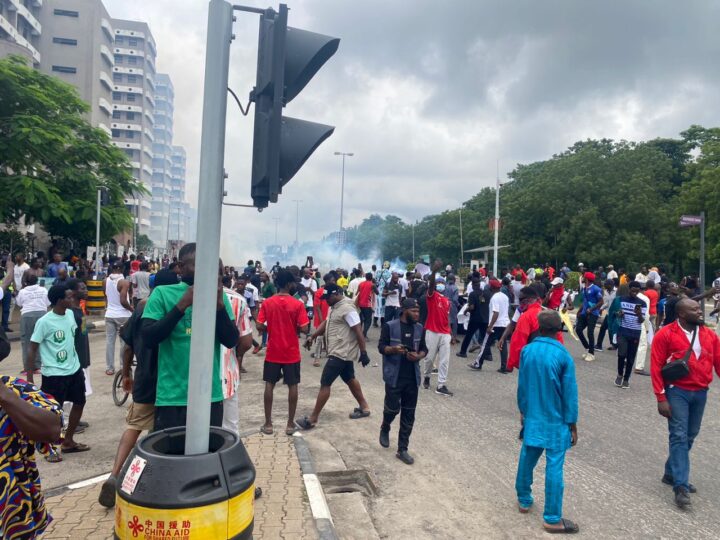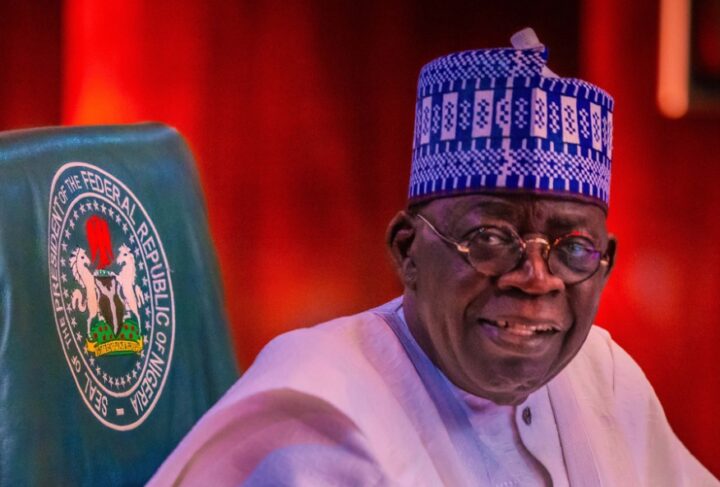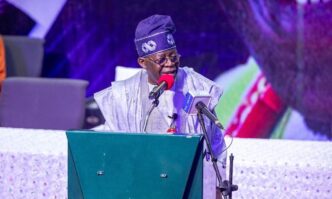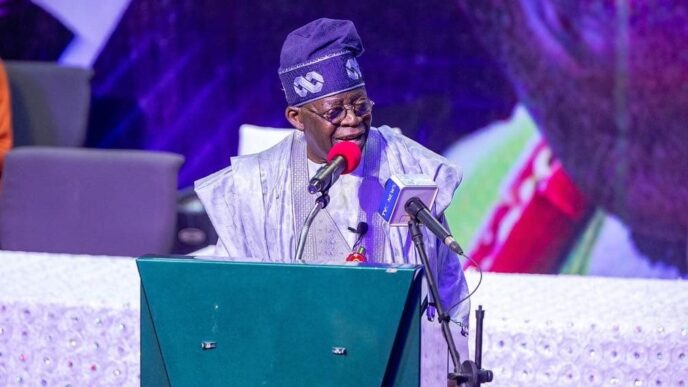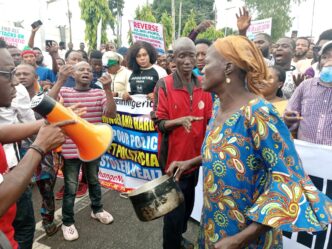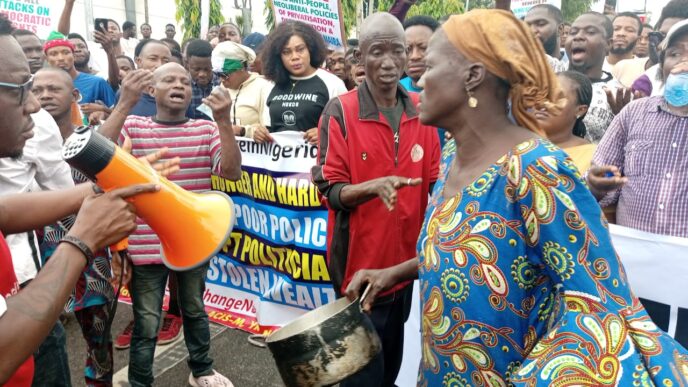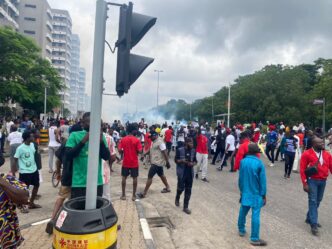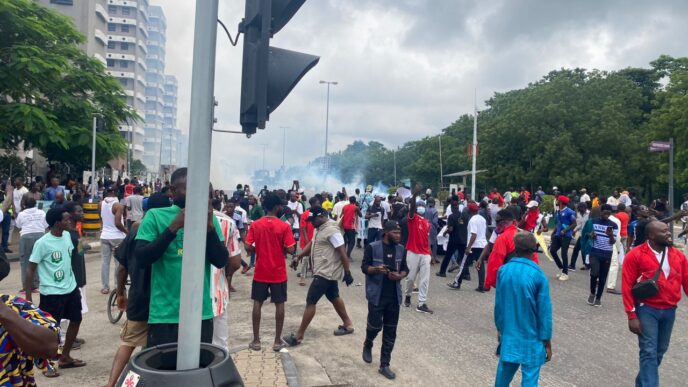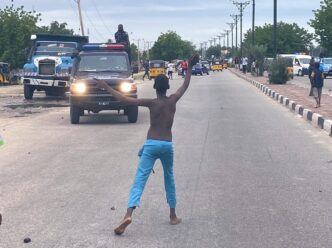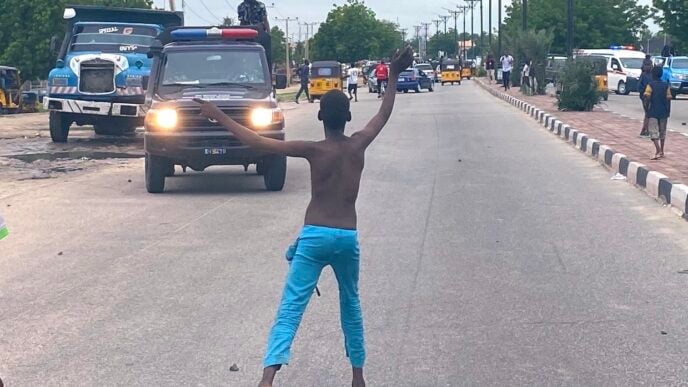File photo taken during the protest against economic hardship in Nigeria
Nigeria, a nation rich in diversity and resilience, is currently in the midst of a significant event. Today, the first day of August 2024, the country has been rocked by a series of protests, a powerful expression of the people’s discontent. These protests, which have spread across cities, are a response to the tinderbox of economic hardship, soaring living costs, and a pervasive sense of despair that has finally ignited. Nigeria is a fascinating country, and Nigerians are exciting people to relate with. Over the past couple of weeks, there has been a lot of excitement and anticipation about the much-awaited national protest scheduled to take place from August 1 – 10, 2024. The call for protest has been ongoing for some months and, therefore, has not come to anyone as a surprise.
The looming spectre of these protests has cast a long shadow over the nation’s psyche for months, underscoring the gravity of the situation. A polarised populace finds itself sharply divided between those who see these demonstrations as a call for change and those who view them as a descent into chaos. The neutral ground, once a refuge for the ambivalent, has diminished, leaving many to choose a side or risk being labelled with suspicion. These so-called neutrals are mostly those who genuinely hold one of the two positions but are unwilling to come clean. Those who support the protests are assumed to be the anti-government group, while those against the protest are labelled the pro-government group.
The initial hours of protest have unveiled a grim tableau. Major cities, from the bustling metropolis of Lagos to the ancient walls of Kano, have borne the brunt of the unrest. The epicentre seems to be Kano, Maiduguri, Kaduna, Sokoto, Gombe, Minna, Lagos, and Abuja. Many state capitals seem to have been relatively quiet. Yet, heart-wrenching images and videos have flooded social media, painting a stark picture of destruction, violence, and loss. Some of the videos are too difficult to watch. A lot of cursing is going on social media; some even find it entertaining and derive pleasure from it all. The digital age, a double-edged sword, has amplified the raw reality of these events, allowing the world to bear witness to the anguish and outrage. Yet, it is also a fertile ground for the cultivation of misinformation, as the insidious manipulation of visual narratives threatens to distort the truth.
None of what has happened and been reported so far should be a surprise. These have consistently been the outcome of most protests in Nigeria, especially the ones that started as faceless before many “owners” began to claim it, mostly for personal aggrandisement and self-promotion. It appears to me that only dishonest people would be surprised that there has been looting, wanton destruction, arson and killings as reported outcomes in the last 24 hours because we have been here before. As we have not prepared for this event differently, there is no reason to expect a different outcome. This is why I labelled anyone claiming to be surprised as dishonest.
Advertisement
But I have digressed. The real issues are substantive. It is a tragic irony that such scenes have become a familiar, if not expected, consequence of protest in Nigeria. The spectre of looting, arson, and bloodshed haunts the nation’s history, a haunting reminder of the fragility of peace and the depth of societal fractures. To feign surprise at these developments is to ignore the stark realities that have fuelled the discontent: a burgeoning youth population grappling with unemployment, a dwindling middle class squeezed by inflation, and a government perceived by many as distant and unresponsive.
The root causes of this unrest are complex and multifaceted. The economy, once a burgeoning giant, now stumbles under the weight of its challenges. The cost of living has escalated incredibly in the last 18 months. The price of fuel, a lifeline for millions, has soared, leaving families struggling to make ends meet. The naira, the nation’s currency, has depreciated rapidly, eroding purchasing power and fuelling economic anxiety. The exchange rate (Dollar, Sterling and Euros) has galloped out of comprehension. Indeed, many are hungry and, therefore, angry. There are far too many who would like to work but are jobless with no hope for the future. Skills are scarce, and many are untrained. Millions of Nigerians wake up and sleep daily, living, nay surviving, on the support of others (and each other). Hundreds of thousands have completed tertiary education of some type, and millions have completed secondary education. Still, they are all stalled with nothing to show for their past education and nothing to aspire to in the future. It is very easy to blame all these people for being destructive. Some people will even label these people as lazy and unwilling to engage their hands. From the outside and without being in their shoes and walking with them, it is easy to misjudge them. The only solution to losing hope and having nothing to hope for is to bring back real and actionable hope. The dreams of a generation have been deferred, replaced by a bleak reality of uncertainty and hardship.
Several news reports have stated that the violence reported in many locations was occasioned by “overzealous protesters or counter-protesters”. To dismiss those who have taken to the streets as merely “overzealous” is to misunderstand the depth of their desperation. You will probably find that no less than two-thirds of the protesters, especially the violent ones and the looters among them, are people without employment or any source of livelihood; hence, these are the “hopeless” ones mentioned earlier. What can a jobless and hopeless person stand to lose for being “overzealous”? There is much to gain, though. We are, therefore, potentially looking at the next nine days of a total breakdown of law and order – anarchy and chaos, to be precise. We have just completed day one.
When hope dwindles, anger can ignite. The coming days promise to be a perilous journey as the flames of unrest threaten to consume everything in their path. The government faces a daunting task: to quell the violence while addressing the underlying issues that have ignited it. The nation, in turn, must find a way to channel the raw energy of protest into constructive dialogue and meaningful change. The path ahead is fraught with challenges, but it is also an opportunity to forge a new Nigeria, one built on the foundations of justice, equality, and hope.
Advertisement
The seeds of envy have been sown, and they promise to bear bitter fruit. Those who hesitated to join the fray today will likely gaze upon the spoils of others with covetous eyes, their resolve weakened by the allure of easy gains. As night falls, a chilling reality sets in the city becomes a fortress under siege. Shops, once bustling with life, stand as ghostly sentinels, their shutters drawn against an unseen enemy. Yet even these fortified outposts offer no guarantee of safety. The flimsy barriers erected to deter looters are as likely to crumble as the hopes of those who depend on them. Many more outlets will be looted tomorrow and beyond, and the barriers put in place will break down. Many more injuries and violence would be reported as both protesters and law enforcement agencies become more agitated and aggressive and make more mistakes. It would become impossible to control protesters, who would become better organised, angrier, daring, empowered, and emboldened.
The coming days portend a grim escalation. As tensions mount and tempers fray, the spectre of violence looms larger. The thin blue line, tasked with maintaining order, is stretched to its breaking point.
Misunderstandings, born of fear and frustration, will undoubtedly ignite fresh conflicts. The protesters, emboldened by their perceived successes, will become a more formidable and unpredictable force. Their ranks will swell as desperation transforms into defiance.
A haunting question emerges: Should this chaos be allowed to persist? Is it merely a symptom of a nation’s democratic right to dissent or a malignant growth that threatens to consume the body politic? The government, caught in a perilous balancing act, must confront the stark reality that its inaction has fuelled the fire. The nation watches with a mixture of dread and resignation, aware that the worst is yet to come. Most Nigerians would not be surprised by the outcome today. Many more would be worried about tomorrow and beyond should the protests continue.
Advertisement
Protests, when conducted with discipline and respect for the law, are the lifeblood of a healthy democracy. They are a platform for voices to be heard, for grievances to be aired, and for change to be demanded. Yet, this fundamental right is predicated upon a delicate equilibrium: the freedom of expression balanced against the rights of others to live without fear. For protests to be successful and to happen regularly (when required), discipline, demeanour, and a commitment to the rule of law are prerequisites. For the rule of law to be effective, there must be equality under the law, transparency of law, an independent judiciary, and access to legal remedies. Arguably, in today’s Nigeria this equilibrium has been shattered or has it ever been recognised? The pursuit of one set of rights has trampled upon another, leaving a trail of destruction in its wake.
The question that lingers is not merely one of legality but of morality. Can a society that permits the disruption of livelihoods in the name of protest truly claim to be just? The government, as the guardian of the social contract, has an undeniable duty to protect the rights of all citizens, not just those who take to the streets. To allow the nation to be held hostage by a minority, however vocal, is a dereliction of duty.
Everyone has equal rights under the law, which means that both those who want to protest and those who are disinterested in any form of protest should be able to function equally in society. For all roads, shops, businesses and government offices to be forced to close because some people (even if they are the majority) want to protest is unfair, inequitable and an imposition. This is what happens in Nigeria every time a protest is looming. Those who support and believe the protest is required and desirable argue for their rights to protest as allowed in the constitution but deliberately ignore the rights of others to a livelihood on the same day. This is the part that requires a more thorough interrogation by society. How can we plan and implement our protests so that artisans or unskilled traders, labourers, or ordinary Nigerians who earn their livelihood daily are also able to continue their livelihood on the side without interruption? Is this not what freedom for all is about? Or are we only interested in the freedom of a few (even if they are the majority – arguably not)?
The government shirks its responsibility to ensure this balance and has regularly sided with those who want to bring society to a standstill. These disruptions have massive economic costs, which are fine as long as only the government is adversely impacted. In most cases, they are rarely impacted. Stopping all activities becomes an imposed coercion on the entire society. We need to prepare society to understand the prerequisites of protests. We cannot continue to put the cart before the horse.
Protests are more regular and more successful in other climates because these perquisites are in place. People are better educated largely, especially about their rights and the rights of others in society; they recognise and respect the rights of others as well and appreciate that the end goal of the protest is not to create chaos and end a functional society but to improve society by putting the government’s feet to the fire, thus ensuring good governance at all times. Because it is mostly peaceful, it has become regular and therefore improved in operation. Protests have to be organised with the protection and collaboration of law enforcement agents. It is not organised to fight law enforcement agents. It does not and should not threaten public peace and order. The route and/or locations are agreed upon well before protests. The organisers are well known and registered to take full responsibility for the mobilisation and organisation of the protests. Active political actors and opposition parties waiting and hoping to take over government are not allowed to participate as a group. The consequence of ignoring this final point is that it can become possible for active and well-organised opposition to use protests to take over the government should they lose an election. If we count, cost, and reflect on the losses to individuals, businesses and public properties as of the end of today, the question should be whether it has been worth it and whether it would end the bad governance being advocated. I am not convinced it does.
Advertisement
It is time for a fundamental shift in approach. Protests must be conducted within a framework that safeguards the rights of all. Organisers must be held accountable for the actions of their followers. Law enforcement must be equipped and empowered to maintain order without resorting to excessive force. And most importantly, the government must address the root causes of the unrest with urgency and determination. Only then can Nigeria hope to emerge from this crisis as a stronger, more united nation.
Gbadamosi can be reached through [email protected]
2
Advertisement
Views expressed by contributors are strictly personal and not of TheCable.
Add a comment
